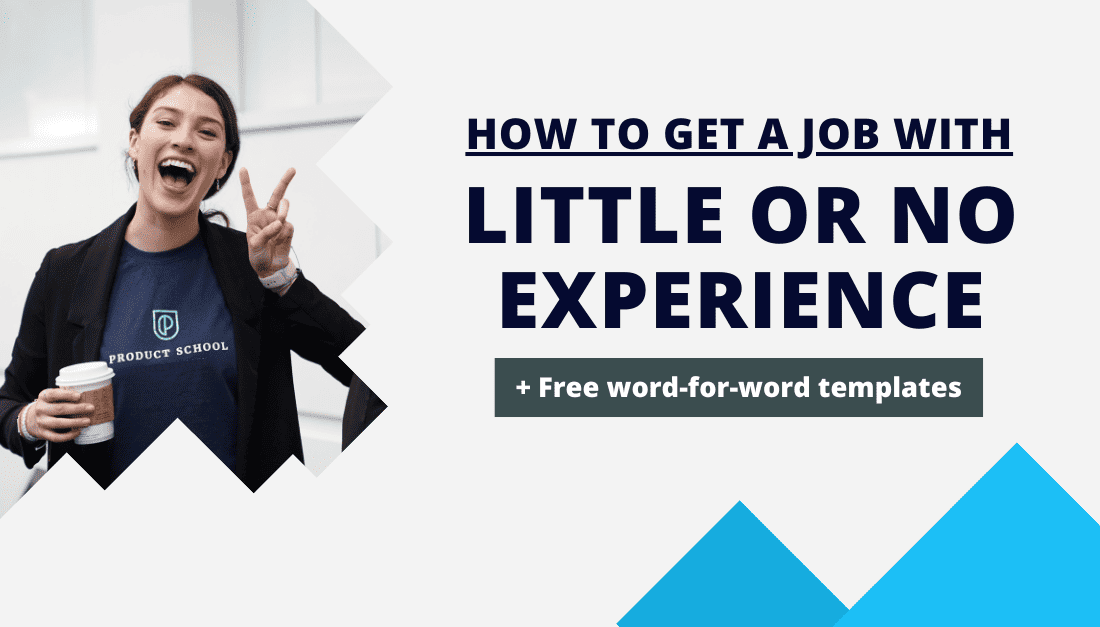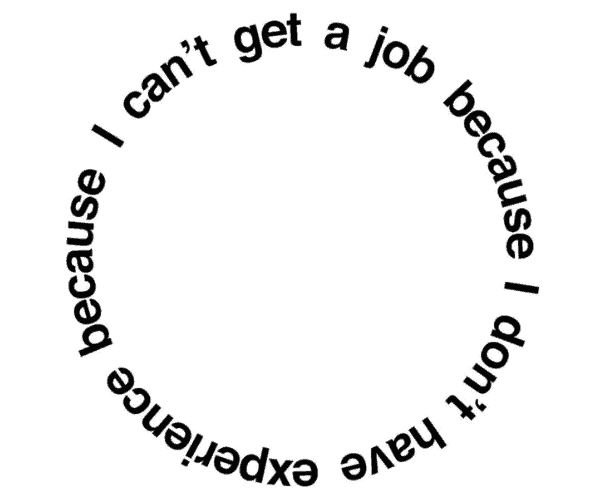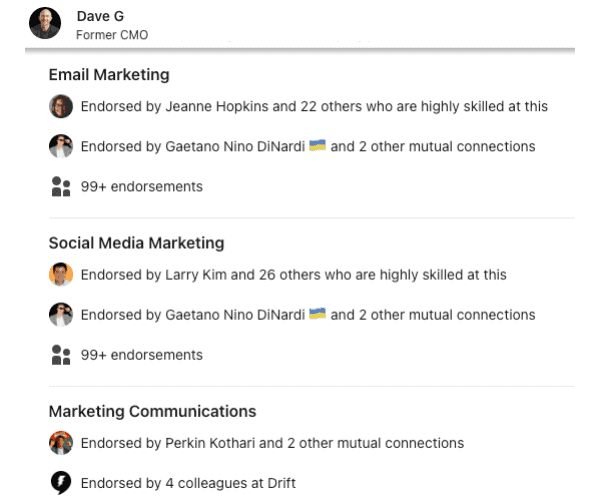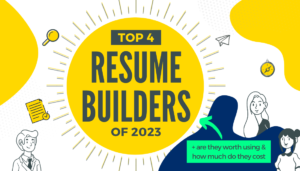
Zero to Hired: How To Get a Job With (little or) No Experience
As with most things in life, the first time is the hardest. This is certainly true when it comes to landing your first job.
Of course, “first job” can mean a lot of things depending on your situation.
Maybe you’ve just graduated and are trying to land your very first “real” job.
Or you've taken a career break and are looking to get back in the workforce
Or you're taking a leap of faith and switching career paths entirely.
Whatever your situation may be, landing that “first job” can seem like an uphill battle — especially when every job ad seems to call for experience.
This is known as the Catch-22 of job hunting: "I can't get a job because I don't have experience, but I can't get experience because I can't get a job."

Well I have some good news and that is: there IS a way out of this cycle!
In this post, I'll walk you through the 3 steps you need to take to land your first role without any prior experience. The steps go as follows:
Step 1: How to find what skills you need
Step 2: How to obtain those skills
Step 3: How to apply those skills to gain experience
So, let's jump right in!
“I Can’t Get a Job Because I Have No Experience.”
First thing's first, we need to acknowledge the reality of the job market. Nowadays, even "entry-level" jobs require 1-5 years of experience. The natural question is then, “How do I gain experience if every job requires experience?"
That's why the Catch-22 of job hunting is very real — you can't get a job without experience, but you need a job to gain experience.
This entire situation is what's known as "job inflation" (yes, it's a real term). It happens when there are more job seekers than available jobs.
Employers can afford to be picky and only hire those who already have experience because they know they'll find someone with the desired skills since the pool of candidates is so large.
The market becomes an “employers' market” rather than a job seekers' market, which makes things more difficult (but not impossible).
👉 While we can't control the job market, we can change our approach to the job search to overcome this challenge of job inflation. Here are the 3 steps to follow:
1. Find the Target Skills
The first step to getting a job with no experience is to pinpoint the skills that are in demand for your desired job and to also identify your transferable skills.
Your transferable skills are the skills you’ve acquired through your education, previous jobs, extracurricular activities, and life experiences that can be applied to different roles.
The most important thing when identifying transferable skills is to look at “hard skills” rather than “soft skills.” Hard skills are technical skills that are specialized to an industry or a role. For example, “project management, cross-functional collaboration, and data analysis” are all skills that you’ll see on job descriptions.
What you DON’T want to focus on are soft skills, such as “communication,” “detail-oriented,” etc. These are general skills that, while very important, aren’t specific enough to make you stand out as a candidate.
Here is a great video from certified Career Coach, Angie Callen, on how to think about your transferable skills:
Once you have a clear idea of your transferable skills, the next step is to research the skills that are currently in demand in your desired role. The 2 best way to do this is:
- Go through several job descriptions of your desired role(s) and note the skills that are mentioned repeatedly across different postings.
- Visit the LinkedIn profiles of professionals in your field and note the skills they have listed on their profile (you'll find these under the "Skills" section)

If you want to really make sure you’re targeting the right skills, I also recommend chatting with people who are already working in your desired industry.
You would be surprised by how many people are willing to help you out if you approach them with honest curiosity.
Here is a short message template you can use:
MESSAGE TEMPLATE
“Hi [name],
My name is [your name] and I’m a recent graduate of [your school]. I’m trying to get into X industry and I’m trying to learn what skills I might need to make that happen. I saw that you’ve been very successful as a [their role] and was wondering if you had any recommendations on tools I should know, skills I should learn, or anything else?
Thanks in advance, I appreciate any guidance you can offer!
[your name]”
(If you aren’t a recent graduate, you can also just jump straight into the second sentence.)
Once you have your list of target skills, it’s now time to…
2. Start Learning Those Target Skills
As you created your list of skills, you may have realized that you’re missing some of the skills needed. Don’t worry, that's completely normal.
Now it’s time to create an action plan to start gaining those skills.
For instance, if you're still in college, there’s a good chance your courses aren’t going to teach you all the target skills you need. If that’s the case, start hunting for clubs or organizations that can provide you with the opportunity to learn those skills.
Don't be a passive learner and let your curriculum dictate what you're learning — instead, take an active approach and carve out your own educational path!
On the other hand, if you've already graduated or aren't in college, there are still plenty of ways to gain whichever skills you need. Here are a few online learning platforms that offer courses for little to no money:
ONLINE LEARNING RESOURCES
- Udemy: An online learning and teaching marketplace where you can learn about everything from personal development and business to IT software, design, and beyond. It houses over 213,000 courses, so you're bound to find something that aligns with your goals.
- LinkedIn Learning: LinkedIn Learning provides courses taught by industry professionals on topics such as business, technology, and creative skills. It's known for its learning paths, which take you through a series of courses to master certain skills.
- Coursera: A popular online learning platform that partners with top universities and organizations (like Google, IBM, Stanford, and the like) to offer courses, certifications, and degrees in various subjects, including but not limited to: social sciences, arts and humanities, language learning, and much more.
- HubSpot Academy: Tailored for individuals interested in inbound marketing, sales, and customer service, this platform offers free certification courses for you to develop skills in digital marketing, content creation, social media strategy, sales enablement, and more.
Online learning has come a long way and you're no longer limited by traditional education. A good place to start is to Google “[your target role] online course” (ex. Content Marketing Course) and look at several options.
👉 Now, taking a course is a good step forward, but the biggest mistake job seekers make is thinking that taking a course is going to land you a job.
It most certainly will not.
The best way to get a job with no experience is to take the step that 99% of people don’t…

3. Apply Those Skills (most important)
The last step after you've identified the role-specific skills you need to acquire and then enrolled in courses to learn them is to apply those skills. It's not enough to just gain the skills and put them on your resume (which is what 99% of people do).
You NEED to have practical experience as well. Without experience on your resume, you won't stand a chance of being hired — it's just the harsh reality of the job market.
If you think we're back to square one with the Catch-22 issue though, we're not. Here are a few ways you can gain experience without having an "official job" just yet:
- Offer your services on a freelance basis. Join some online freelance platforms, look for opportunities on social media, or reach out to your network.
- Ask your friends, family or small business. Offer to help them with a project or something else they need.
- Take up volunteer opportunities. Look for non-profits or organizations in your community that align with your interests and offer to lend a hand.
- Do a micro-internship. Micro-internships are when you do a real project for a real company. Organizations like Parker Dewey are a great way to find micro-internships.
☝ This is the hard, uncomfortable step that most people don’t take, but that actually makes a difference.
On a personal note, this is how I made my career pivot in 2016. I spent 14 months applying to jobs with zero success. Then I offered to help a total stranger on Facebook with a blog post he was writing. I put the experience on my resume and immediately doors started opening up.
It can truly be that simple.
The “secret” to getting a job with no experience is getting that little, tiny morsel of experience that you can put on your resume.
Most importantly, you want to make sure that the experience is the same title as the role you're after. For instance, if you're trying to become a graphic designer, make sure that the projects or volunteer work you undertake is related to design.
👉 After completing these projects, make sure you add the experience as a real job to your resume.
This is a big one. There's a common misconception that only "official" jobs hold weight on a resume, but that's not true. Any practical experience should be included to showcase your capabilities — it doesn't matter whether it took place in a paid or non-paid environment.
Now You’re ready to Apply to Jobs
Now that you've worked hard to gain some experience, it's time to show it off. This is where you optimize your resume to the fullest. An AI resume builder can be super helpful with this and most of them are free to use.
If you’re not sure where to begin with your resume or want to learn more about how to make it stand out, we offer a free resume course that covers everything you need to know.
So, that’s how to get a job with no experience. Find the target skills, learn the target skills, apply the target skills and, most importantly, add that experience to your resume as a real job.
Remember, even if you have little to no experience, showing you're constantly learning and improving goes a long way with hiring managers. Once you set your sights on growth and development, that next job can be just around the corner.
More from the blog:
Ultimate Career Goals Planner: How to choose your career goals (+7 examples)
Ultimate Career Goals Planner: How to choose your career goals (+7 examples)A mentor of mine once...
Good Weakness for Interview: How to Craft the Perfect Answer (+10 Examples)
Good Weakness for Interview: How to Craft the Perfect Answer (+10 Examples)One of the biggest...
Top 9 Questions for Second Interviews: What to expect & how to answer
Top 9 Questions for Second Interviews: What to expect and how to answer Congratulations! 🎉 If...
Like this? Try our free courses!
Tired of sending your job applications into a black hole and never hearing back? Get hired faster with our guided courses all for FREE!
Bogdan Zlatkov is the Founder of GHYC and author of "The Ultimate Guide to Job Hunting", ranked #1 on Google. He has been featured in the Wall Street Journal, Fast Company, HR Dive, and more. At GHYC, Bogdan creates job search courses & tools by working with award-winning career coaches, best-selling authors, and Forbes-Council members. Prior to GHYC, Bogdan led the content programs at LinkedIn Learning.
